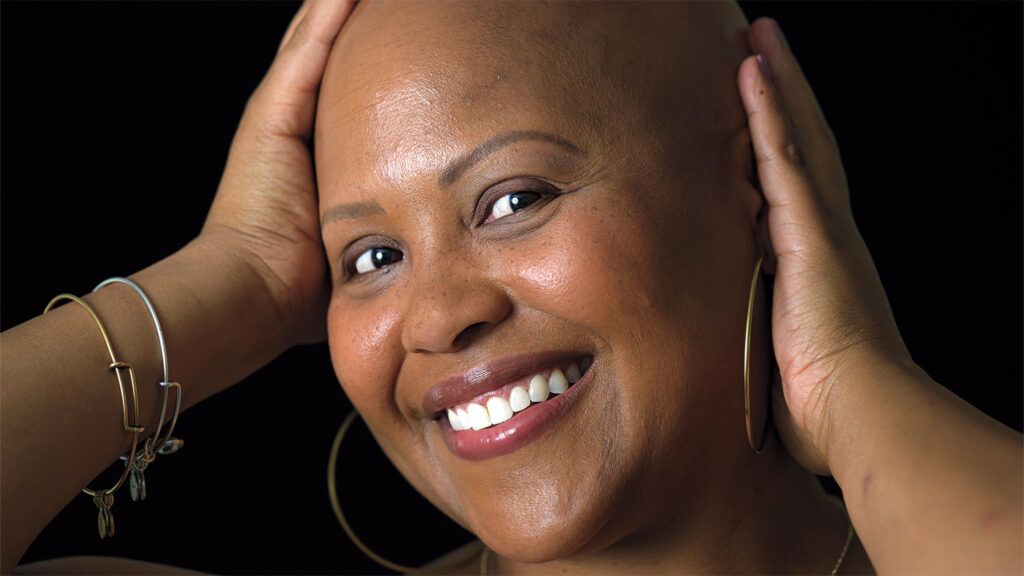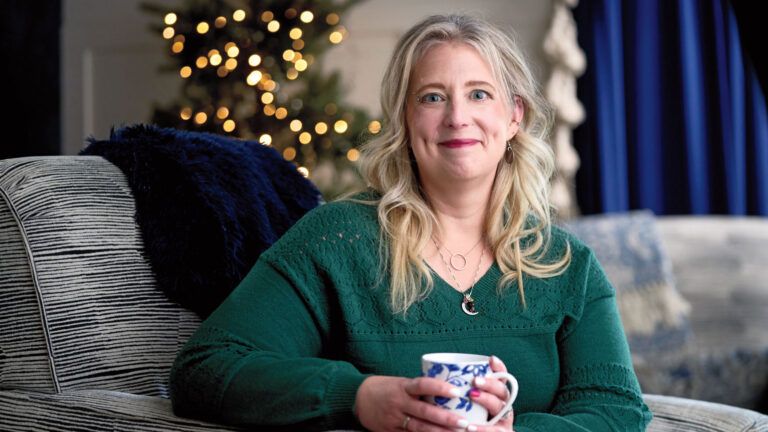The first day of school, fall of 2014. I’m a high school Spanish teacher, and I was getting ready to go to work. I looked in my bathroom mirror, and all I could focus on was my bald head. Never mind my carefully penciled eyebrows, my more-confident-than-I-felt smile. My eyes were drawn to my hairless scalp, and I knew everyone else’s would be too. My colleagues, my students…was I ready to have them all staring at me, wondering or even asking if something was wrong? I’d never liked calling attention to myself.
So much had changed in the two and a half years since I’d noticed the first signs of hair loss. I’d never given my hair much thought before that. In high school, I’d been an athlete, so I mostly kept my hair in a ponytail. During college, then my early years as a teacher and wife, I wore it long, curls cascading to my shoulders. My first daughter was born in 2009. A few minutes of styling before work or church was all I had time for.
That’s what I was doing one morning in January 2012 when I saw pea-size bald patches on my head. I made an appointment with a dermatologist. She did a cursory examination. “I wouldn’t worry about it,” she said. “Call me if they get bigger.”
In March, I learned I was pregnant again. I was so excited, I forgot about the bald spots until I found a clump of hair in the bathtub drain. The patches had grown to the size of a quarter.
Worried, I went to a new dermatologist in Philadelphia. She examined my scalp and asked about everything from my hair care routine to the stress in my life. “You have alopecia areata,” she said. “It’s an autoimmune disease. No one’s sure what triggers it, but your immune system mistakenly attacks your hair follicles. The important thing to know is, alopecia is not a health concern.
”There was nothing physically wrong with me?“
For some people, it’s a temporary condition with partial hair loss,” the doctor said. “Others lose all the hair on their scalp and body permanently.”
Temporary condition. I clung to those words. The doctor said there were treatments that could help reduce hair loss, but I didn’t want to risk any side effects while I was pregnant.
Mercifully, I was able to style my hair to cover the worst of the patches so no one noticed as the school year wound down. By summer, the hair on the sides and back of my head was thinning. I hadn’t wanted to worry my mother, but I needed her reassurance. She had lost her hair while she was undergoing cancer treatment years earlier. She would understand what I was going through.
I went to her house. “I need to show you something,” I said. I pushed my hair aside so she could see the bald patches. “It’s alopecia.”
“You’ll be okay, Tabitha,” she said. “You can deal with this.”
She led me upstairs, where she kept a collection of scarves and head wraps. Mom showed me different ways to tie them. “Remember, with or without hair, you’re always beautiful in God’s sight,” she said. “You are fearfully and wonderfully made.”
I marveled at my mother’s faith and strength. Even dealing with cancer, she’d been a rock. I wished my faith were as unshakable.
As the bald spots grew, so did my questions and doubts. I wondered if I’d done something wrong, something to bring this upon myself. I started losing the hair on my eyebrows, the rest of my body. “God, what’s happening to me?” I asked. “I just want to understand.”
Unlike my mother, who thrived on being front and center, I was more comfortable staying in the background. I’d never liked drawing attention to myself, but with my hair loss, there was no avoiding it. Even with a scarf covering my head, I felt exposed.
All summer, I left the house only when I had to. I told people I was focusing on my three-year-old and my pregnancy. Really, I was hiding, pulling away from everyone, even God.
I dreaded going back to work. I called the principal to tell him about my condition and that I’d be wearing a scarf. “Whatever you’re comfortable with,” he said. “We’ll support you.”
The first day of school, I sat in my car in the parking lot, trying to work up the nerve to walk into the building. I retied my scarf, making sure it was secure. It could be worse, I told myself, imagining the humiliation of teaching with my balding head uncovered.
I hurried into my classroom before the first bell. Teachers sometimes share personal anecdotes with their students, to build a relationship while maintaining professional boundaries. I hadn’t figured out what to say if a student asked about my scarf. To my relief, my students were too caught up in their own lives to ask about mine. One young woman wearing a wide headband, the kind some athletes wear, smiled warmly. I gave her a tentative smile back and turned to the day’s lesson. After the last bell, I rushed home to hide again.
That became my pattern. Soon I’d lost nearly all the hair on my body. I went back to the dermatologist.
She explained that I had alopecia universalis, a type of alopecia areata with the most advanced hair loss. “Your hair is unlikely to grow back,” she said. Then she took a long look at me. “I don’t say this to everyone, but, sister, you can really rock the bald.”
I was crushed. I forced back the tears. This was never going to get better. I yanked my scarf around my head and left. In the safety of my car, I let go and sobbed. “God, what do I need to do to fix this? Please tell me!”
The semester passed in a kind of numb grief. It seemed as if I had lost more than my hair. I’d lost my sense of myself. A teacher was supposed to explain things and find answers, yet I wasn’t able to find an explanation for my condition. I couldn’t shake the feeling that it was a punishment for some failing of mine, like an Old Testament curse.
My baby was born in December, a beautiful girl. I was grateful she was healthy. Maternity leave gave me a chance to shut myself away again. I made excuses for not seeing friends and family. In my isolation, my feelings of unworthiness increased.
I went back to teaching when my leave ended, counting the days until summer break. I wore scarves and stayed away from mirrors. I avoided talking to people too. The few I chose to tell about my condition were supportive, but that didn’t change how I felt about myself. It wasn’t that I thought I looked ugly. I felt shame because I believed my baldness was calling attention to the fact that something was wrong with me spiritually.
If only I knew how I’d let God down. Had I not been obedient enough? Good enough? Was I no longer worthy of his love? Thinking I had to earn his grace, I read my Bible with greater purpose than before, delving deep into his Word. I watched online sermons, taking careful notes.
I stuck with this regimen through summer and the following school year. My alopecia didn’t improve—I lost what little hair remained—but slowly something inside me shifted. Instead of looking at myself and worrying that I was spiritually lacking, I looked to God. Trusting him absolutely, the way my mother did, was what made us spiritually complete.
One day, I was reading Luke 12. Verse 7—“Indeed, the very hairs of your head are all numbered. Don’t be afraid; you are worth more than many sparrows”—resonated with me. God knew every hair I’d lost, even better than I did. I was fearfully and wonderfully made. Like the sparrows, I was created by God. Known by him. Loved by him.
My spiritual growth was what had me standing at my bathroom mirror on the first day of school in 2014, wondering if it was time to stop hiding and reveal my bald self to my students and colleagues. I dressed in the plainest, least attention-getting outfit I owned and pulled on a scarf. I was keeping my options open.
In the school lot, I sat in my car for a moment. It’s now or never, I prayed. God, I trust your love. I pulled off my scarf, grabbed my bag and walked to the building. I reached up and touched my smooth scalp. I could hardly believe it…. I was out in public with my head uncovered! My first-period students filed into my classroom. They did a double-take when they saw me. I pointed to my bald head. “Y ves que no tengo pelo (You see I have no hair),” I said. “No estoy enferma, pero es que tengo alopecia (I’m not sick, but I have alopecia). Soy fuerte y sana (I’m strong and healthy).”My students nodded. It was no big deal to them. I was rocking the bald!
Between class periods, an old student dropped by. I remembered her, the one with the sporty headband and warm smile. “Ms. Williams! It’s so good to see you,” she said, giving me a big hug.
“There’s something I want to share with you,” she said. “You’ve probably noticed I always wear a headband.”
She reached up to pull it off. Underneath were bald patches.“I’ve been afraid to tell anyone I have alopecia,” she said. “But seeing you today, hearing how up-front you’re being…it’s given me the courage to share my secret.”
Never could I have imagined my alopecia being a source of inspiration to others, a way of serving God. But he had known all along.
“Thank you,” I said. “You don’t know how much you’ve helped me.”
The bald patches were barely noticeable, her face was so aglow with newfound confidence. “I want you to know that you’re beautiful,” I said. “Fearfully and wonderfully made.”
For more inspiring stories, subscribe to Guideposts magazine.





